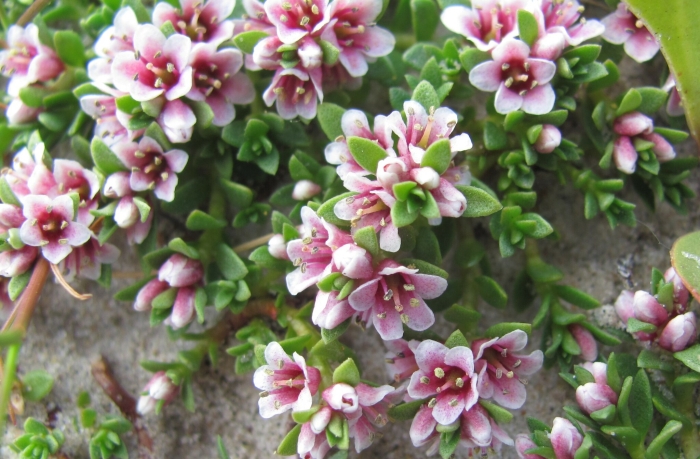Sea Milkwort
(Lysimachia maritima)
Sea Milkwort (Lysimachia maritima)
/
/

Aalbert Rebergen
CC BY 4.0
Image By:
Aalbert Rebergen
Recorded By:
Copyright:
CC BY 4.0
Copyright Notice:
Photo by: Aalbert Rebergen | License Type: CC BY 4.0 | License URL: http://creativecommons.org/licenses/by/4.0/ | Rights Holder: Aalbert Rebergen | Publisher: iNaturalist | Date Created: 2013-06-07T18:22Z |

























Estimated Native Range
Summary
Lysimachia maritima, commonly known as Sea Milkwort, is a perennial herb that is native to coastal salt marshes, brackish environments, and wetlands across Europe, central Asia, and North America. It is particularly adapted to saline conditions and can be found at various elevations, including up to 8,500 feet in North America. Sea Milkwort typically forms low, dense clumps reaching 2-6 inches in height and spreading outwards with fleshy, glaucous leaves that contribute to its distinctive appearance. The plant produces small, apetalous flowers with a notable pink petaloid calyx, which bloom from late spring to midsummer, adding a subtle charm to its habitat.
Sea Milkwort is valued for its ability to thrive in challenging wet and saline environments, making it a suitable choice for water gardens, rain gardens, and coastal restoration projects. It is also used in traditional medicine for various ailments. In cultivation, it requires consistently moist or wet soils, tolerates a range of soil types including clay and sandy soils, and prefers full sun to partial shade. While not commonly found in the horticultural trade, it can be a unique addition to specialized plantings. Gardeners should be aware that in some areas, it can spread aggressively through self-seeding and rhizomes, potentially becoming invasive outside its native range.CC BY-SA 4.0
Sea Milkwort is valued for its ability to thrive in challenging wet and saline environments, making it a suitable choice for water gardens, rain gardens, and coastal restoration projects. It is also used in traditional medicine for various ailments. In cultivation, it requires consistently moist or wet soils, tolerates a range of soil types including clay and sandy soils, and prefers full sun to partial shade. While not commonly found in the horticultural trade, it can be a unique addition to specialized plantings. Gardeners should be aware that in some areas, it can spread aggressively through self-seeding and rhizomes, potentially becoming invasive outside its native range.CC BY-SA 4.0
Plant Description
- Plant Type: Herb
- Height: 0.5-1 feet
- Width: 0.5-1 feet
- Growth Rate: Moderate
- Flower Color: Yellow
- Flowering Season: Summer
- Leaf Retention: Semi-deciduous
Growth Requirements
- Sun: Full Sun, Part Shade
- Water: Medium
- Drainage: Medium, Fast
Common Uses
Erosion Control, Low Maintenance, Salt Tolerant, Water Garden
Natural Habitat
Coastal salt marshes, brackish environments, and wetlands across Europe, central Asia, and North America, including up to 8,500 feet in elevation in North America
Other Names
Common Names: Seaside Loosestrife, Hai Ru Cao, Saltwort, Shio-Matsuba, Umi-Midori, Sea Pimpernel
Scientific Names: , Lysimachia maritima, Glaucoides maritima, Glaucoides maritima var. obtusifolia, Glaux generalis, Glaux maritima, Glaux maritima f. brevifolia, Glaux maritima f. longifolia, Glaux maritima f. submersa, Glaux maritima subsp. maritima
GBIF Accepted Name: